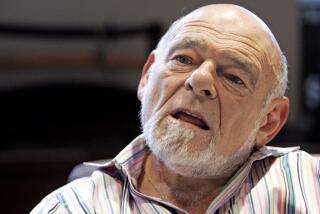UPI May Be Turned Over to Creditors : If Current Talks Fail, News Service Could Face Liquidation
- Share via
Officials of United Press International, the nation’s second general news agency, said Monday that they are negotiating to turn control of their financially troubled service over to its major creditors.
If an agreement is reached, control of UPI, which provides photos and news to thousands of media organizations worldwide, will pass into the hands of American Express Corp., RCA and American Telephone & Telegraph. Privately, UPI officials admit that without such an arrangement their service may run out of money within a week and, perhaps, face liquidation.
The plan to reorganize follows months in which UPI tried and failed to attract investors in a minority share of the company. Ninety percent of UPI is owned by two Nashville businessmen, Douglas Ruhe and William Geissler, telecommunications entrepreneurs whose only asset is a UHF television station in Chicago, Channel 66, with an estimated value of about $10 million. Without additional investors, Ruhe told The Times last December, he lacked the funds to keep UPI alive.
President, Consultant Fired
News of the reorganization was made public Monday, when UPI announced that Ruhe and Geissler had agreed to “relinquish control of the news agency . . . to guarantee its financial future.”
At the same time, the company announced that Ruhe and Geissler were firing UPI President Luis Nogales and financial consultant Ray Wechsler, both of whom were involved in negotiating the reorganization.
According to UPI officials, the reorganization plan was formulated after Nogales and Wechsler became convinced that they would not find anyone to invest in UPI as long as Ruhe and Geissler retained control.
In addition, Nogales and other UPI officials said, UPI’s primary lender, Los Angeles-based Foothill Capital Corp., began to demand that the company work out some plan to relieve itself of its estimated $17 million in unpaid bills, including $5 million to $7 million owed to Foothill.
Nogales said in an interview Monday that, under these two pressures, Ruhe and Geissler finally agreed to give up their control last week and that a plan was being negotiated with creditors and Foothill to reorganize the company. Under the plan, creditors would forgive what UPI owed them in exchange for accepting partial ownership of the news service.
Relations between the owners and Nogales, however, collapsed over how much of UPI Ruhe and Geissler would retain. According to a UPI story Monday, Nogales and Foothill wanted the owners to keep a 10% share of the company with 15% going to other top officers.
Ruhe, UPI reported, wanted 25% and, according to one friend, viewed Nogales’ plan as a coup attempt. Sunday night, Ruhe called Nogales at the home of Foothill President John Nickoll and fired him. On Monday, UPI reported, three more top UPI managers had resigned in support of Nogales: Bob Brown, vice president for communications; Jack Kenney, vice president and controller, and Steve Spritzer, a budget officer.
Ruhe and Geissler were unavailable for comment Monday, but Ruhe aide Lana Bogan said that the company now was working on a plan in which control of UPI would pass to RCA, AT&T; and American Express and that the details would be worked out within a day or two. UPI owes money to RCA, AT&T; and American Express for services rendered.
AT&T; spokesman John Geoghegan confirmed that the company was negotiating with UPI, but he said any report of a plan by which AT&T; would be part of a controlling consortium was “premature.” Officials at American Express did not return phone calls, and RCA officials were unavailable.
UPI’s financial problems are not new. The company last turned a profit in 1963, and in September Ruhe and Geissler told executives that the service was losing $2 million a month.
Some believe that the source of UPI’s problems is the general unprofitability of wire services. The only other for-profit service, Reuters, lost money until it diversified into financial information. The Associated Press is a nonprofit cooperative owned by its newspaper members. Most foreign services are government owned.
While most newspaper executives say a second wire service helps ensure a more aggressive and accurate press, most media organizations subscribe to only one general news agency. Thus, when UPI was put up for sale two years ago, no buyers emerged.
Scripps Howard, which founded UPI 78 years ago, finally sold the service to Ruhe and Geissler for $1 and gave the new owners nearly $10 million to run it. In exchange, Scripps Howard was absolved of any liability if UPI collapses.
Without capital of their own to invest, Ruhe and Geissler sold off several of UPI’s assets, including its foreign photo operation, its interests in a commodity news service and a television news film agency, leased the rights to its photo archives and worked to upgrade the news product.
However, the new owners ran out of money in September. Hoping to buy enough time to find an additional investor, Ruhe and Geissler convinced UPI’s staff to accept pay cuts beginning at 25%.
UPI was suggesting publicly that the strategy was working, reporting a profit of $1.1 million in the fourth quarter--its first in 21 years.
Several UPI executives, however, said they viewed that profit skeptically. One former UPI executive who left recently said that the news service began to lose clients in large numbers and that its unpaid bills began to mount up, despite the announcement of a profit.
“A lot of major newspaper clients are leaving,” the official said, requesting anonymity.
More to Read
The biggest entertainment stories
Get our big stories about Hollywood, film, television, music, arts, culture and more right in your inbox as soon as they publish.
You may occasionally receive promotional content from the Los Angeles Times.










